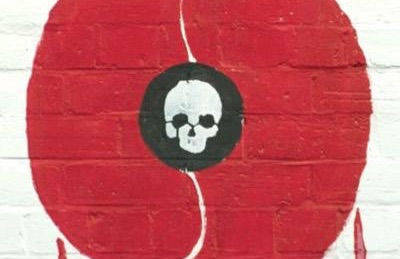
By Eamonn McCann
Daily Mail readers are no dozers. Literally within seconds of Sienna Miller stepping into shot on the Graham Norton Show on Saturday night “eagle-eyed viewers” spotted she wasn’t wearing a poppy.
The camp Corkonian star was sporting a poppy the size of a dinner plate. His other guests - Bradley Cooper, Maggie Smith and Alex Jennings - all had flowers of more modest proportion affixed to their lapels. But Miller’s shimmering pale pink gown was innocent of embellishment.
“There can be no excuse,” thundered Conservative MP Gerald Howarth. But maybe Sienna just didn’t want her gown ruined by a poppy-pin snagging the material.
And I mean - crimson on pale pink? Come on!
She will have been offered a poppy. The ritual has become standard practice at the BBC. Wearing the emblem is not a condition for appearance on screen. But the fact that the offer is made puts guests in a position of having to refuse.
This situation doesn’t arise with regard to any other commemorative insignia. There would be murmuring of discontent in these parts if, in the run-up to Gay Pride, guests on The View were routinely offered an equal marriage badge before going into the studio.
Last year ITV News presenter Charlene White felt compelled to issue a statement explaining that her decision not to wear a poppy on air didn’t imply disrespect for the dead of World War One.
She donated every year to the British Legion. She wore a poppy every Armistice Day, knitted for her by the mother of a friend. She came from a forces family. Her dad and her uncle, both veterans, supported her decision.
She shouldn’t have had to volunteer all this information. And maybe she shouldn’t have bothered, given that her explanation did little to staunch the torrent of racist and sexist abuse directed her way on social media.
If Bert Trautmann were still around, would he be invited to pick from a tray of poppies before running onto the field at the Etihad to play for Manchester City?
Trautmann was a former German paratrooper who first came to Britain as a prisoner of war in 1944. He was one of only 90 members of his 1,000-strong regiment to have survived the conflict.
He was to become one of the most popular players in Britain. He broke his neck with 15 minutes to go in the 1956 FA Cup Final at Wembley, but played on (no substitutes in the days of proper football) to help City to a 3-1 victory over Birmingham.
He won’t have been offered a poppy, because back then nobody would have been so crass. And, while football has always been about more than sport, the determined deployment of the game in the service of a particular view of history or politics had not yet become standard practice.
Last year a picture of another brilliant City player from a country which had been at war with Britain was published in seemingly every British newspaper: Argentina striker Sergio Aguero wearing a poppy.
Does anybody seriously imagine that Aguero decided for himself to wear the badge because he believed this was the right thing to do? Hardly. He did it because he had been given to understand that this was expected of him. Likewise for Arsenal’s Mesut Ozil, the German international son of Turkish immigrants.
These days you are not making a gesture wearing a poppy on a television chat show or a football field. You are making a gesture if you don’t.
Thus it is that James McClean is deemed to be taking a provocative stance by insisting on making no political statement while playing football.
It’s widely pointed out that other Irish footballers in England just wear the poppy and get on with it. Any those who have ever seriously pondered the issue will likely have decided that they don’t need the hassle.
Professional footballers tend to be young men making good money in a career that they know won’t last long. Nobody has a right to demand that they take a position on this, or on anything.
By the same token, nobody has the right to demand that James McClean take a particular view on the wearing of the poppy. He shouldn’t have to keep explaining.
Or, at least, not until the footballing authorities and the BBC explain the basis on which they came to the political belief that the embrace of the emblem should be the default position of all proper citizens.
Until then the Creggan man, too, should be allowed to get on with it.
![[Irish Republican News]](https://republican-news.org/graphics/title_gifs/rn.gif)
![[Irish Republican News]](https://republican-news.org/graphics/title_gifs/harp.gif)

